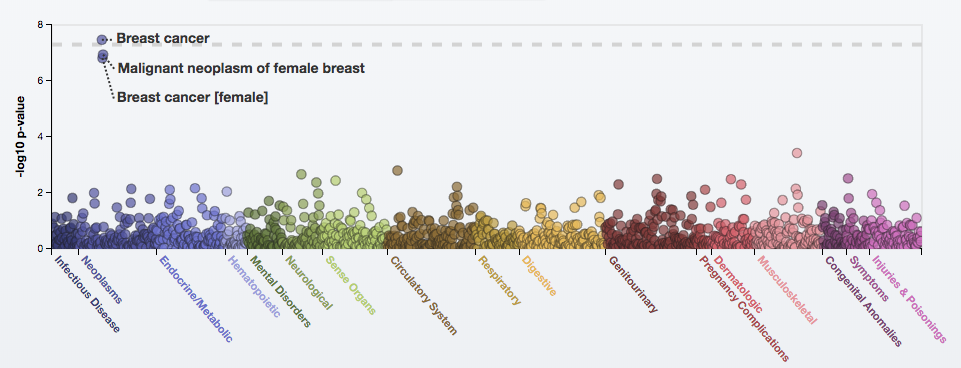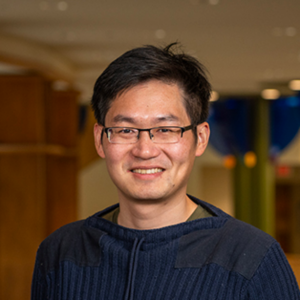Zhenke Wu is an Assistant Professor of Biostatistics, and a core faculty member in the Michigan Institute of Data Science (MIDAS). He received his Ph.D. in Biostatistics from the Johns Hopkins University in 2014 and then stayed at Hopkins for his postdoctoral training before joining the University of Michigan. Dr. Wu’s research focuses on the design and application of statistical methods that inform health decisions made by individuals, or precision medicine. The original methods and software developed by Dr. Wu are now used by investigators from research institutes such as CDC and Johns Hopkins, as well as site investigators from developing countries, e.g., Kenya, South Africa, Gambia, Mali, Zambia, Thailand and Bangladesh.
Profile: At a “sweet spot” of data science

By Dan Meisler
Communications Manager, ARC
If you had to name two of the more exciting, emerging fields of data science, electronic health records (EHR) and mobile health might be near the top of the list.
Zhenke Wu, one of the newest MIDAS core faculty members, has one foot firmly in each field.
“These two fields share the common goal of learning from the experience of the population in the past to advance health and clinical decisions for those to follow. I am looking forward to more work that will bring the two fields closer to continuously generate insights about human health.” Wu said. “I’m in a sweet spot.”
Wu joined U-M in Fall 2016, after earning a PhD in Biostatistics from Johns Hopkins University, and a bachelor’s in Mathematics from Fudan University. He said the multitude of large-scale studies going on at U-M and access to EHR databases were factors in his coming to Michigan.
“The University of Michigan is an exciting place that has a diversity of large-scale databases and supportive research groups in the fields I’m interested in,” he said.
Wu is collaborating with the Michigan Genomics Initiative, which is a biorepository effort at Michigan Medicine to integrate genome-wide information with EHR from approximately 40,000 patients undergoing anesthesia prior to surgery or diagnostic procedures. He’s also collaborating with Dr. Srijan Sen, Associate Professor, Department of Psychiatry and Molecular and Behavioral Neuroscience Institute, on the MIDAS-supported project “Identifying Real-Time Data Predictors of Stress and Depression Using Mobile Technology,” the preliminary results of which recently matured into an NIH-funded R01 project “Mobile Technology to Identify Mechanisms Linking Genetic Variation and Depression” that will draw broad expertise from a multi-disciplinary team of medical and data science researchers.

“One of my goals is to use an integrated and rigorous approach to predict how a person’s health status will be in the near future,” Wu said.
Wu applies hierarchical Bayesian models to these problems, which he hopes will shed light on phenomena he describes as latent constructs that are “well-known, but less quantitatively understood, e.g., intelligence quotient (IQ) in psychology.”
As another example, he cites the current challenge in active surveillance of prostate cancer patients for aggressive tumors requiring removal and/or radiation, or indolent tumors permitting continued surveillance.
“The underlying status of aggressive versus indolent cancer is not observed, which needs to be learned from the results of biopsy and other clinical measurements,” he said. “The decisions and experience of urologists and their patients will greatly benefit from more accurate understanding of the tumor status… There are lots of scientific problems in clinical, biomedical, behavioral and social sciences where you have well-known but less quantitatively understood latent constructs. These are problems that Bayesian latent variable methods can formulate and address.”
Just as Wu has a hand in two hot-button big data areas, he also sees himself as straddling the line between application and methodology.
He says the large number of data sources — sensors, mobile apps, test results, and questionnaires, to name just a few — results in richness as well as some “messiness” that needs new methodologies to adjust, integrate and translate to new scientific insights. At the same time, a valid new methodology for dealing with, for example, electronic health data, will likely find numerous different applications.
Wu says his approach was heavily influenced by his work in the Pneumonia Etiology Research for Child Health (PERCH) funded by the Gates Foundation while he was at Johns Hopkins. Pneumonia is a clinical syndrome due to lung infection that can be caused by more than 30 different species of pathogens, including bacteria, viruses and fungi. The goal of the seven-country study that enrolled more than 5,000 cases and 5,000 controls from Africa and Southeast Asia is to estimate the frequency with which each pathogen caused pneumonia in the population and the probability of each individual being infected by the list of pathogens in the lung.
“In most settings, it is extremely difficult to identify the pathogen by directly sampling from the site of infection – the child’s lung. PERCH therefore looked for other sources of evidence by standardizing and comprehensively testing biofluids collected from sites peripheral to the lung. Using hierarchical Bayesian models to infer disease etiology by integrating such a large trove of data was extremely fun and exciting”, he said.
Wu’s initial interest in math, leading to biostatistics and now data science, stems from what he called a “greedy” desire to learn the guiding principles of how the world works by rigorous data science.
“If you have new problems, you can wait for other people to ask a clean math question, or you can go work with these messy problems and figure out interesting questions and their answers,” he said.
For more on Dr. Wu, see his profile on Michigan Experts.
Recent publications
From experts.umich.edu
Accomplishments and Awards
- 2021 Propelling Original Data Science (PODS) Grant Award: Scientifically-Structured Latent Variable Methods for High-Dimensional Data to Individualize Healthcare
